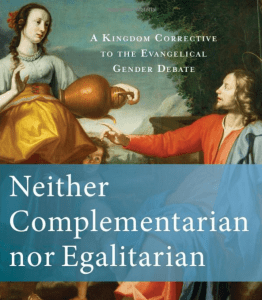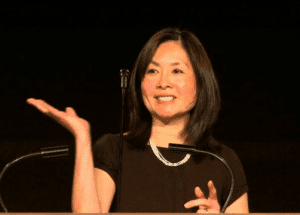 I once heard of a well known Christian leader/theologian who claimed this: “leadership is the imposition of the leader’s will on others.” Michelle Lee-Barnewall would disagree, and do so quite firmly. Imposing one’s will on others flatly contradicts cruciform existence.
I once heard of a well known Christian leader/theologian who claimed this: “leadership is the imposition of the leader’s will on others.” Michelle Lee-Barnewall would disagree, and do so quite firmly. Imposing one’s will on others flatly contradicts cruciform existence.
In our previous post on Lee-Barnewall’s book Neither Complementarian nor Egalitarian we examined her sketch of the history and culture at work in understanding the relationship of females and males in the church and society. In today’s post we want to look at her kingdom challenges to leadership in both the complementarian mode, which focuses on authority, and the egalitarian mode, which focuses on rights. She thinks both authority and rights are unraveled and reshaped in kingdom theology. (She never adequately defines kingdom, but she follows the basic theses of George Eldon Ladd, which makes kingdom about “reign” as a dynamic power.)
She examines ministry in two parts and marriage in two parts; both focusing on the major terms of the debate. For marriage she examines Gen 2-3 and Eph 5, and I fault her and many others for totally ignoring the Song of Solomon. No theology of marriage in the Bible can be constructed without careful examination of Song of Solomon; to ignore is to ignore the very examples Lee-Barnewall is looking for in the NT.
Which leads me to this observation: the agenda for this book has been established by the complementarian critique of egalitarianism and the egalitarian critique of complementarianism. Those categories, as her book shows, need to be challenged. Which is what Lee-Barnewall does in this book by looking at kingdom. But I suspect if one began with kingdom an entirely different set of categories would arise.
Furthermore, the old questions will not go away: Can a woman be a senior pastor or can a woman preach on Sunday morning or can a woman bless the eucharist? These questions will be asked, and always are asked in churches, and her kingdom theory approach does not answer them. Shifting the categories to deeper categories sheds important purpose-concentrating light on the purpose and goal, but they don’t change the big question many women ask: Can I be the senior pastor and can I be the teacher in this church? The theme of unity or reversal, in fact, might be the strategy of the complementarian to resist women as senior pastors; the egalitarian could use each in order legitimate women as senior pastors. I appreciate Lee-Barnewall’s themes, I just don’t think they get us where we need to get at the local church, in the pragmatics of church decisions, and to resolve the questions of the individual male or female.
 Here are some of Michelle Lee-Barnewall’s major conclusions, including a kingdom emphasis, which concentrates on gifts that lead to unity and reversal, including ta good look at the big claim of “equality.” Instead…
Here are some of Michelle Lee-Barnewall’s major conclusions, including a kingdom emphasis, which concentrates on gifts that lead to unity and reversal, including ta good look at the big claim of “equality.” Instead…
This gifting may result in “equality,” although in the context of God’s purposes it is better understood as leading to “inclusion,” since the dominant concern is not individual rights and benefits but God’s grace to all his people, Jew and gentile, male and female. 168
Complementarians are challenged by these kingdom themes:
Complementarians should be able to integrate this concept more fully into an overall theology of ministry for both men and women. They should be able to show how the ministry of leaders points toward God, not the leaders themselves, and highlights the power of the cross, not just personal areas of competence and responsibility. Furthermore, both positions should be able to show how their view promotes love and unity in the body. 168
A summary statement of hers about gender would include this:
Instead, gender in the Bible may relate more fundamentally to the holiness of God’s people and the impact of grace on relationships in the family of God, so that the focus is on God and the good of the other rather than oneself. 169
Lots of terms need to be reworked and redefined: patriarchy, feminism, complementarity, and not least mutuality:
Considering the role of mutuality can benefit both positions and thus the overall discussion since it relates strongly to unity. For example, Gal. 3:28, which we discussed in terms of “inclusion,” has stronger implications for the diverse groups to be “one” in their love for one another than “granting] equal status and privilege” to these groups, as in an egalitarian interpretation. At the same time, the complementarian assertion that Gal. 3:28 refers to an equality in “spiritual standing” as God’s “image-bearers” but with differences in “role and function in the church” focuses more on the separateness of the genders than on their intimate unity. Both positions, therefore, may miss the critical relational dimension of the passage, which speaks to the oneness of God’s people who are reconciled in the new age. 172
Notice again here emphasis on unity. Also, on reversal, which shows that attaching “servant” leadership is not softening of leadership but revolutionizing leadership:
An oppressive, self-serving, or authoritarian leadership is not biblical leadership but the opposite. “Servant leadership” does more than soften our attitude toward leadership and instead includes the acceptance of suffering and loss by those who would be “great.” The “servant leader” who follows Christ’s example depends on God alone, not on a position of influence and power, for identity. Our notions of authority or leadership must be able to account for Paul’s conception of power manifested through weakness as a means of displaying the power of God among his people. 174
Church leaders are not to grasp for power but are to be the first to set the example of sacrifice and suffering, to give up the rights of their position for the sake of the whole. 175
Authority may provide order and efficiency but not intimacy. 175
So we need new questions, and these are hers:
We can reframe the debate by asking additional questions such as “How could male leadership lead to unity and oneness?” and “How could equality promote sacrificial living on behalf of others ?” 175
Does a focus on male authority lead to improper attention on and status for those in leadership instead of God, whose servants they are, or the members of the body of Christ, whom leaders are called to equip? Does an emphasis on rights feed an unhealthy desire to satisfy our own needs rather than seeking God first in humble dependence and obedience? If neither authority nor equality is sufficient for explaining gender in the Bible, a paradoxical “reversal” applied to both concepts can help point us to critical kingdom goals. What “authority,” “leadership,” “equality,” and “rights” have in common is that they often highlight the individual over the community and God himself. What their reversals share is the potential to guide us to a greater acknowledgment of God’s sovereignty and a recognition of God’s ways in which the willing sacrifice for the other through the denial of self-interest results in unity and love. 177










